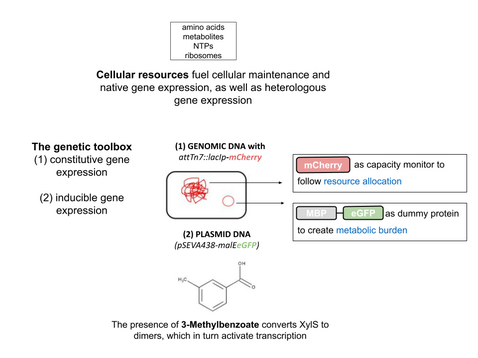CHEAP: Dissection of the cellular processes during heterologous protein production in Pseudomonas putida - or how much is a protein? (2019-2022)
Overproducing heterologous proteins with microorganisms represents an unnatural load for the cellular machinery, as it consumes energy and essential cellular resources, and is often accompanied by low host productivity. This additional stress, in the form of reduced cell growth and increased mutation rates, continues to be a challenge in biotechnological applications and has been coined in the literature as metabolic burden. The CHEAP project focuses on doing basic research of metabolic burden with Pseudomonas putida. This rod-shaped, Gram-negative, and saprotrophic soil bacterium is characterized by fast growth, low nutrient demand and intrinsic resistance to diverse stresses. Due to physiological advantages over commonly employed hosts, like Escherichia coli and Bacillus subtilis, P. putida has been recognized as a powerful synthetic biology workhose.
We are interested in the following research questions:
(i) What is the metabolic cost for the production of a protein?
(ii) Where are the bottlenecks during heterologous protein production?
(iii) Can this information be generalized and eventually predicted?
To tackle these questions, we artificially create metabolic burden by inducing production of the MBPeGFP fusion protein and study the effect on resource allocation by implementing mCherry as genomic reporter protein and also incorporating metabolomics analyses. This project is funded by the Deutsche Forschungsgemeinschaft and has the Toulouse Biotechnology Institute as projectpartner.
Former project supervision: M.Sc. Ana Sofia Ortega
